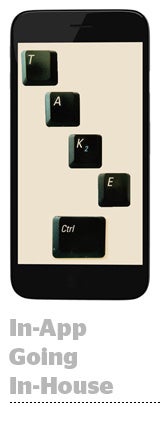It’s taken longer for real-time auctions to make their way into the app world than on the web.
But programmatic is finally starting to take hold and change the way developers buy media thanks to several parallel trends.
And a new crop of opportunistic startups is emerging to help developers take advantage of the shift away from the ad network model.
Two such startups, London-based Dataseat and Kayzen out of Berlin, both raised small seed rounds in mid-January – $2.3 million and $4 million, respectively – from savvy investors hoping to capitalize on this slow but long-overdue transformation.
It’s been lagging until recently because apps, unlike mobile and desktop sites, don’t have a header, and mediation platforms and ad networks historically didn’t support RTB. Partners that wanted to compete in an auction would need their SDK integrated, or the app would need to shift to a server-side setup. This led to slower adoption.
The technical barriers are coming down, however, as ad networks and mediation platforms begin to offer bidding options. At the same time, app developers are pushing for more transparency in their monetization relationships, especially as Google and Facebook introduce more automation into their ad networks, which means less control for developers over the media buying process.
The desire for control and transparency is leading some app publishers, such as Tel Aviv-based mobile social game developer Playstudios, to bring their programmatic media buying in house.
“It was the obvious thing to do,” said Noga Laron, head of marketing at Playstudios, which now spends between 10-20% of its budget through DSPs. Playstudios is partnering with Kayzen to help with the in-housing process.
“Google and Facebook are becoming a black box and there are not a lot of ways we can leverage the key learnings we gathered in past years,” Laron said. “RTB is one of the only [ways] sophisticated advertisers can bid on the user level and optimize based on the value they predict from each user.”
Moving away from the waterfall and getting more direct access to inventory also helps excise nontransparent fees from the supply chain, said Tim Koschella, Kayzen’s founder and the former CEO of AppLift. But doing it right requires developers to be as good at buying and placing ads as the middlemen they used to work with.
“It’s a learning process, it takes time and you can’t expect immediate results,” he said.
Despite developers making the move to manage their programmatic media buying in house, they still require some hand-holding, which is part of the service Dataseat sells, said David Philippson, a former Criteo exec who founded Dataseat last year.
“The challenge is having the resources and the skills, because you’ve got to set your own bid price, have your own ROI goals, make your own bidding decisions – it’s not easy,” Philippson said. “You can’t just say, ‘Here’s a license to a DSP and over to you, good luck,’ because then they’ll probably have a bad experience.”
Both Dataseat and Kayzen offer self-serve demand-side platforms and the ability for apps to buy inventory directly using their own bidder.
Dataseat has already attracted a roster of large-scale publishers, including Jam City, Socialpoint and M&C Saatchi Performance, which works with Zipcar, Zappos and Amazon’s Audible. But the even bigger growth opportunity for in-housing will come from medium-sized and longtail app developers.
“We don’t just want the largest advertisers, we want to democratize media buying,” Philippson said. “It really is a very big addressable market out there.”
Kayzen’s seed round was led by InReach Ventures, with participation from Lifeline Ventures and a handful of angels, including Timo Soininen, CEO of Small Giant Games, which sold to Zynga in 2018 for $560 million. Dataseat raised its seed round from Play Ventures, Backed.vc and SAATCHinvest, with angel pinch hitting from ex-Criteo CEO Eric Eichmann and others.














